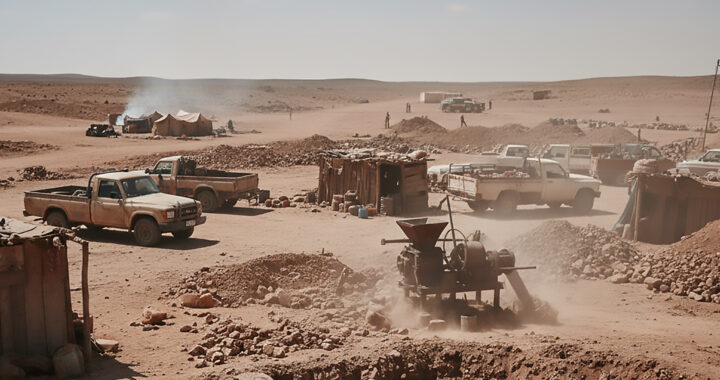In 2017, Ghana launched an ambitious war against illegal small-scale gold mining, widely known as galamsey. The government instituted a moratorium on all small-scale mining, dispatched joint military-police units, and formed inter-ministerial committees. The campaign initially appeared forceful, but years later, the results revealed deep institutional failures.
War on Galamsey Failure: Why the Fight Against Illegal Small-Scale Mining in Ghana Failed
A crackdown meant to save rivers and forests instead revealed corruption, missing machinery, and a democracy under pressure.
Background: Ground Beneath the Conflict
The problem was not policy design, but rather poor implementation influenced by elite complicity. Despite the suspension of operations, gold production from small-scale mines increased. This paradox raised questions about the role of political elites, corruption, and institutional capture undermining environmental governance and law enforcement.
Researchers Gordon Crawford and Gabriel Botchwey pursued the investigation to explain these contradictions. They combined interviews with miners and residents, fieldwork in Western and Central regions, and analysis of government reports, production statistics, and leaked documents. Their findings exposed patterns of corruption and governance weakness.
The concept of democracy capture is used to describe the situation. This refers to a condition in which democratic institutions and regulatory agencies are systematically manipulated by elites to protect private interests. In Ghana, this translated into selective enforcement, manipulation of mining licenses, and protection of politically-connected illegal operators.
Findings: What the Evidence Reveals
Results showed how measures intended to halt environmental destruction instead created space for elite profiteering. Regulators often protected powerful actors. Weaker miners and communities faced harsher restrictions. Leaked documents and media reports highlighted lost machinery, compromised officials, and the slow pace of corruption prosecutions.
• Established Protection Networks: Political and business elites were linked to financing or shielding illegal mining operations. A leaked 2021 report accused senior government officials of benefiting from galamsey. Investigative journalism revealed corruption within the inter-ministerial anti-illegal mining task force.
• Corruption Within Law Enforcement: The military and police units tasked to handle galamsey faced alleged extortion, bribery, and collusion. Confiscated machinery reportedly disappeared or was resold, showing systemic corruption. Regulatory officials occasionally acted as protection rackets rather than neutral enforcers.
• Weak Regulatory Accountability: Prosecutions of implicated officials often stalled or were dismissed, leading to limited deterrent effect. Appointments of political allies into regulatory bodies fostered institutional weakness. These practices created a regulatory environment vulnerable to manipulation or exploitation.
• Political Economy Considerations: Electoral politics complicated strict enforcement. Politicians were reluctant to alienate communities dependent on small-scale mining for income. Thus, enforcement efforts targeted selected operators while others, often aligned with ruling party interests, continued without interruption.
Takeaways: Lessons in the Rubble
The offshoots of this governance failure were widespread. Bodies of water became polluted with mercury and cyanide, farmlands were uprooted, and forest reserves were destroyed. Communities reliant on agriculture suffered livelihood disruptions, while government revenues diminished due to smuggling, tax evasion, and undervalued gold sales.
Democratic legitimacy also eroded. Citizens observed that accountability was applied selectively and that elite networks of politicians and businesses shielded themselves from consequences. Scandals emerged, but little changed. Such patterns deepened public skepticism about the impartiality of institutions and weakened confidence in the rule of law.
The researchers concluded that bans alone cannot succeed without independent institutions and consistent accountability. Reforms that reduce political interference, empower civil society, and ensure follow-through on corruption cases were urged. Without such measures, environmental destruction and democratic erosion will continue to reinforce one another.
Illegal mining in Ghana shows the limits of policy when elite capture dominates governance. The war on galamsey reflected the challenges of enforcing environmental protection in resource-rich democracies. Until institutions act independently and public accountability prevails, both the democratic fabric and natural resources of Ghana remain at risk.
FURTHER READING AND REFERENCE
- Botchwey, G. and Crawford, G. 2025. “Small-Scale Mining, Environmental Destruction and Democracy Capture: The Government of Ghana’s Failed War on Galamsey.” Democratization. 1-22. DOI: 1080/13510347.2025.2489018
